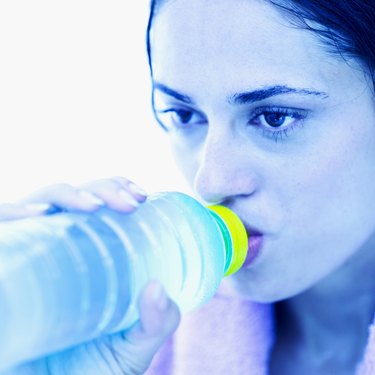
Sports drinks have come under fire as a contributing factor for the increased incidence of kidney stones. Because sports drinks contain potassium and sodium in their ingredients, it is assumed these salts contribute to an increased urinary calcium excretion, causing the formation of kidney stones. There is little or no evidence suggesting a relationship between sports drink consumption and an increase in kidney stone formation. Keeping hydrated with fluids such as water, juice or sports drinks may reduce kidney stone formation.
Kidney Stones
Video of the Day
Different types of kidney stones can form in your kidneys and your diet can promote or inhibit their formation, according to the National Institute of Diabetes and Digestive and Kidney Diseases, or NIDDK. Calcium oxalate and calcium phosphate, the most common type of kidney stones, sometimes form when high salt in the diet causes an increased urinary output. The increased output causes higher amounts of calcium to be excreted in the urine, which can lead to kidney stone formation.
Video of the Day
Dietary Sodium
The maximum recommended intake of dietary sodium is 2,400 milligrams per day and but average American consumes 3,300 milligrams, according to the NIDDK. High sodium intake increases the risk of calcium stone formation, so most doctors recommend a low-salt diet and drinking plenty of water. Salty snacks, processed foods, canned soups, packaged meals and sports drinks contribute to a high-sodium diet. Eliminating one item, such as sports drinks, from your diet is not usually enough to change urine sodium excretion. A registered dietitian can assist you in designing a complete low-sodium diet.
Sports Drinks Ingredients
Sports drinks contain carbohydrates, minerals, electrolytes and flavoring. Their intention is to replenish electrolytes lost by sweating during prolonged exercise. The amount of sodium varies per product. One 8-ounce serving of Gatorade contains 110 milligrams of sodium, while Powerade contains 54 milligrams and All Sport Body Quencher has 55 milligrams, all small amounts of sodium, compared to your daily sodium intake.
Research on Connection
A study published in the 2008 "Urology Research" states that adults drinking 946 milliliters of sports drink daily did not have any increase in their urinary sodium or calcium. Because the sports drinks studied did not change urine chemistry, it is predicted that such drinks would not affect kidney stone formation. High-sodium sports drinks, such as Gatorade Endurance, may pose a risk but currently no studies have been completed on these types of drinks.
Points to Consider
Sports drinks and energy drinks are not the same. Sports drinks replenish water and electrolytes, while energy drinks contain non-nutritive stimulants, such as caffeine. Regularly drinking sports drinks is usually not necessary and may contribute to increasing calorie consumption, as well as dental erosion. The NIDDK notes that plain water is best. If you exercise for more than two hours or you sweat excessively, be sure to replenish your fluids, as dehydration is a risk factor for calcium kidney stone formation.
- Pediatrics: Clinical Report -- Sports Drinks and Energy Drinks for Children and Adolescents: Are They Appropriate?; Committee on Nutrition and the Council on Sports Medicine and Fitness
- European Food Information Council: The Role of Sports Drinks
- National Kidney and Urologic Diseases Information Clearinghouse: Diet for Kidney Stone Prevention
- U.S. Department of Veterans Affairs: Preventing Kidney Stones
- Johns Hopkins Medicine: Kidney Stones Occurring More Often in Children
- Urological Research: Effect of Two Sports Drinks on Urinary Lithogenicity
Is this an emergency? If you are experiencing serious medical symptoms, please see the National Library of Medicine’s list of signs you need emergency medical attention or call 911.